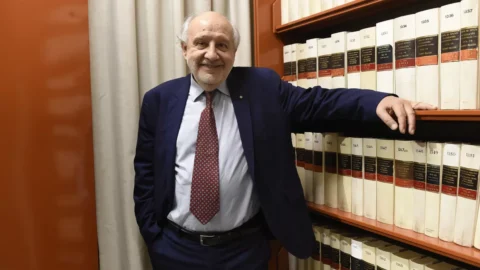Jeff Bezos and Elon Musk, who want to go and open mines on the asteroid belt, would have been perfect as Jules Verne characters. Bas Lansdorp would have been even more so, the young Dutch engineer who expects to have a village on Mars ready in 2025 and has already had 200 subscriptions from aspiring settlers willing to take a one-way trip, it should be noted. Lansdorp plans to finance the enterprise with the largest global television reality show, in which we will see live the selection interviews, the training simulations in the desert and in the ice, the flight and then the daily life of the Martian settlers. Guy Debord, the situationist philosopher of the society of the spectacle, would not have thought that we would go that far.
Verne, in any case, was great not only in his technological visions, but also in drawing characters bordering on madness who seem to have come out of the chronicles of our years. Chief among these is Captain Nemo, an ante litteram apocalyptic ecologist who radically contrasts good and generous nature with greedy and destructive humans, thus choosing to spend his life under the seas, which reward him with the extraordinary abundance of their resources.
Let us therefore pay homage to Verne's Nemo and to the Alice of his other great contemporary Lewis Carroll. Let's go through the magic looking glass, dive under water and enter the mysterious inverted world of negative bond yields, where creditors pay interest to debtors.
Let's not look at the causes, it would be heavy and a bit boring, and let's try instead to get to know the strange characters who invest their money, even immobilizing it for ten years, knowing from the outset that in the end they will have lost a good part of it. Who I am? Why do they do it?
The first subject we meet in this underwater world of friendly madmen is the legendary Bundesbank, the German central bank. We know that the Germans have insisted so much in recent weeks that the purchases of securities for Quantitative Easing should be made not directly by the ECB, but by the individual national central banks. Each of them will therefore buy its country's debt and if Ruritania or Pontevedro default, only the respective central banks will lose out. Thus, the Bundesbank will soon be the largest buyer of German bonds, which are already largely negative yielding and will soon become even more so.
In deeper waters we find the group of traders, who are less mad than the Bundesbank because, at least in intention, they hope to earn something. The trader therefore buys a bond that is also long (indeed, the longer the better, perhaps even with leverage) with a negative yield, counting on the fact that the yield will soon become even more negative. So the trader buys German bonds today and expects to sell to the Bundesbank in a few weeks at an even stranger price. The profit (direct or via bonus) will then be spent on a vacation in the tropics or on a new car. It's just one of a thousand ways QE helps the real economy.
Continuing our journey we find the bank treasurers, who every day have to decide how to use the excess reserves and find themselves with parts of the interbank curve at a negative rate. For them, accustomed to high-precision calculations on subatomic yields, lending money to another bank by paying a few basis points is still better than leaving everything with the ECB, where the penalty is 20 basis points.
Later we meet euro-based investors buying 1976-year bonds in Swiss francs. They don't care about the negative yield because they think that the appreciation of the franc will continue in the coming years and will compensate them for the loss on interest. We ask them why they don't just buy thousand-franc notes. They mention legislation, fires, floods and thieves. One of them remembers that Slovenian mechanic who in 21 kidnapped Richard Oetker, son of a German industrialist, and hid the 1979 million marks ransom in the garden. In 15 the mechanic was arrested and served 9 years in prison. When he came out he found that 12 million had been eaten away by the mold. He tried to get the other XNUMX changed in England, but even on the uncrumbled banknotes there was some mold left which made them suspicious. He was arrested again and did another two years. In the end, left with nothing, he wrote an autobiography from which a film was made, Der Tanz mit dem Teufel.
Another investor tells us that he filled up on negative Bunds because he feels protected against redenomination risk. It was the great fear of autumn 2011, we tell him, but today the weak euro greatly reduces the incentive for the periphery to leave on his behalf. He replies that Germany could accompany us all in the long descent of the euro and then in 2017, if we really are below parity with the dollar as Goldman Sachs, Deutsche Bank and many others say, it could abandon us, perhaps leaving us at 0.90 and returning alone at 1.10. Switzerland abandoned the euro too early, Germany will be more careful. As for political considerations, we'll see. If on the one hand Merkel has left the scene and on the other there will be many Tsipras to govern the periphery, the German interest in keeping Europe together may even wane. We salute the investor. His reasoning draws a possible scenario, but at the moment very unlikely. And then there is always the risk that Germany will repay its Bunds in euros, at least to non-residents.
We conclude our tour with a brief surfacing among the boats of a group of fishermen. It's the pension funds, accustomed to drawing very long securities and keeping them in the cold hold until maturity. They are concerned, particularly the Germans, because long-end yields are dangerously close to zero. For some time they will get by with the securities bought in the past years, but how to replace them when they begin to expire? In theory, a simple rule could be adopted. Headlines from countries that do Qe should be replaced with headlines (even short ones) from countries that don't (for example, right now, the US and China). Indeed, one of the intended consequences of Qe is devaluation. Easy said but less done, because pension funds often have constraints that hold back investments denominated in foreign currencies.
The first part of our journey ends here. Next week Captain Nemo will take us with the Nautilus to visit the seabed and their enormous reserves of methane hydrates.
Meanwhile we continue to suggest selling US stocks on strength and buying European stocks (especially exporters) on weakness.





